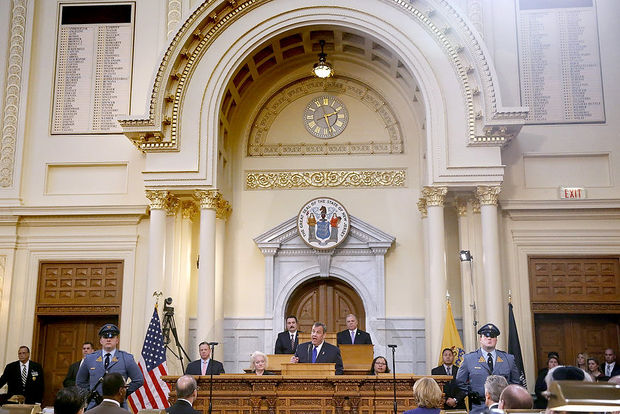
|
| Governor Chris Christie will deliver his Fiscal Year 2016 Budget Address to the Joint Legislature and the people of New Jersey while in the State House's Assembly Chambers. Tuesday February 24, 2015. Trenton, NJ, USA (Aristide Economopoulos | NJ Advance Media for NJ.com) |
|
NJ.com - TRENTON - To say that the New Jersey's unions remain unsold on Gov. Chris Christie's freshly unveiled pension reform proposal is to say that Boston's had a few flurries this winter.
Just hours after the governor claimed he'd reached an "unprecedented accord with the New Jersey Education Association" that would "solve our long-term problems with the pension and health benefit systems," the criticism poured in, from the NJEA, from other union leaders and even a former New Jersey governor.
NJEA president Wendell Steinhauer claimed the teacher's union was "deeply disappointed" that Christie "overstated the nature of the understanding" reached with the governor's commission after months of talks.
"The pension plan's long-term problem has always been the state refusing to put the money in," said Hetty Rosenstein, New Jersey state director of the Communication Workers of America, "Now, here we go again." The New Jersey chapter of the CWA represents some 40,000 state workers, as well as 15,000 county and municipal workers.
In the summer of 2011, Christie sought to stabilize the funds by signing a law that mandated significant increases in the employee contribution rates of the state's major unions and increases in the retirement age for new members. In return, the state agreed to ramp up pension payments each year.
But last year, Christie withheld a $2.4 billion funding contribution after the state's revenue forecasts fell far short, prompting lawsuits from pension administrators and a judge's ruling that he was wrong to withhold $1.57 billion in the current fiscal year.
"No matter how many back room meetings transpire, there won't be a solution until we address the problem by putting the legally required money into the pension," said Rosenstein, "If Christie continues to break the law — which was upheld yesterday in the court — New Jersey's pension funds could go bankrupt in 10 years."
But Patrick Colligan, president of the New Jersey State Policemen's Benevolent Association, noted that as his union is funded by municipalities, it is in far better financial shape than those funds that have been shorted by the state through the years and his members should not face higher costs and lower benefits.
"To propose solutions to further reduce employee benefits essentially ignores the math of (Police and Firemen's Retirement System)," Colligan said, adding that the plan "punishes nearly 40,000 law enforcement officers and firefighters who have no part to play in the state's underfunded pension plans.
His derision was echoed by Edward Donnelly, president of the New Jersey Firefighters Mutual Benevolent Association.
"We have seen the results of Christie's previous 'reforms', increased obligations to our members, while New Jersey taxpayer's burden continues to be even greater," said Donnelly. "Instead of more deceptive back-room deals, now is the time for us to stand together to bring about meaningful changes that save our pension system without further burdening taxpayers."
New Jersey currently faces a $37 billion unfunded pension liability — $83 billion if you tally it under new accounting rules — but it's hardly alone: Last year, State public pension plans across the nation were underfunded by $4.7 trillion, up from $4.1 trillion in 2013, according to State Budget Solutions, a nonpartisan, non-profit think tank based in Virginia.
In announcing his plans, Christie took aim at previous governors, whom he assailed for "an eagerness to please and to say what people wanted to hear in the past has led to high levels of state employee benefits without the willingness to actually fund those benefit levels."
Former New Jersey Governor Jim Florio was in attendance, and took umbrage at that allegation, retorting that "I was the last governor to fully fund the pension system," and calling Christie's plan "an interesting way of offloading the responsibilities of the state onto somebody else."
Asked if he thought it was a bad idea, Florio said "the jury is still out" but said the far more important than any of the plan's proposals was that the state actually make its required funding contributions.
"The state has to start giving the money in," said Florio, adding that the unions can't play their hand "unless the cards have been dealt. He didn't cause the problem, but he hasn't handled it yet."
This article appeared on NJ.com authored by Claude Brodesser-Akner. http://www.nj.com/politics/index.ssf/2015/02/nj_unions_former_governor_deride_christie_pension.html
|
